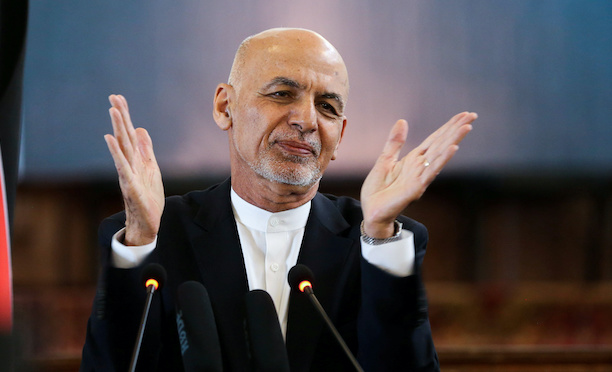
Afghanistan’s President Ashraf Ghani gestures during celebrations to mark Afghan New Year (Newroz), in Kabul, Afghanistan March 21, 2021. (REUTERS)
WASHINGTON — U.S. President Joe Biden will meet at the White House with Afghan President Ashraf Ghani and chairman of Afghanistan’s High Council for National Reconciliation Abdullah Abdullah on Friday to discuss U.S. troop withdrawal amid a surge in fighting between Afghan forces and the Taliban across the country.
In their first face-to-face meeting, Biden will seek to reassure Ghani and Abdullah of U.S. support for the Afghan people including diplomatic, economic and humanitarian assistance, the White House said in a statement. Biden will also repeat his pledge to ensure that the country never becomes a safe haven for terrorist groups.
“The visit by President Ghani and Dr. Abdullah will highlight the enduring partnership between the United States and Afghanistan as the military drawdown continues,” the White House said.
However, since Biden’s decision in April to pull out all U.S. troops before Sept. 11 to end America’s longest war after nearly 20 years of conflict, at least 30 districts have been seized by the Taliban.
The group has staged a campaign to expand its influence across the country as the United States began withdrawing troops on May 1 and closed some bases and handed them over to the Afghan government.
The Taliban was not immediately available for comment and there was no immediate reaction from Ghani’s office.
But a senior Afghan official said the Afghan president would be seeking assurances from the United States over its continued support for Afghan security forces in the aftermath of the withdrawal.
The visit would also come in the face of slow progress in talks between the Taliban and Afghan government representatives in Qatar. Officials have raised concerns over the stalling negotiations and have said the Taliban has not yet submitted a written peace proposal that could be used as a starting point for substantive talks.
In May, U.S. intelligence analysts released an assessment that the Taliban “would roll back much” of the progress made in Afghan women’s rights if the Islamist extremists regained national power.